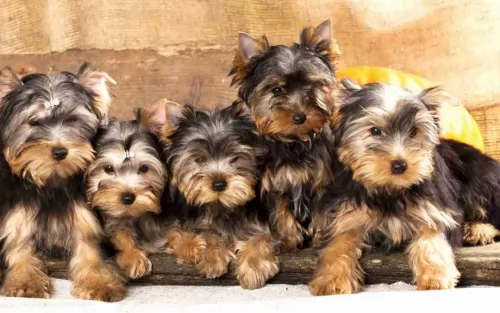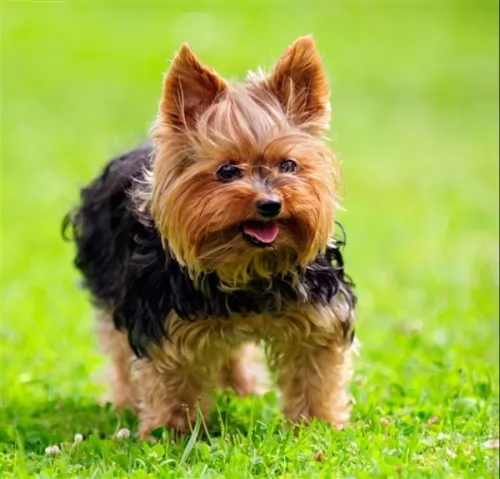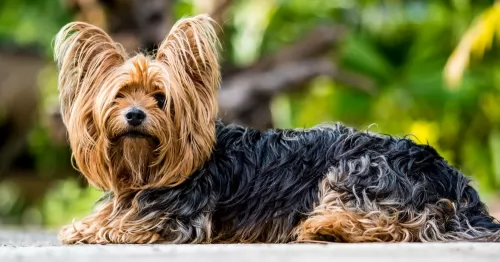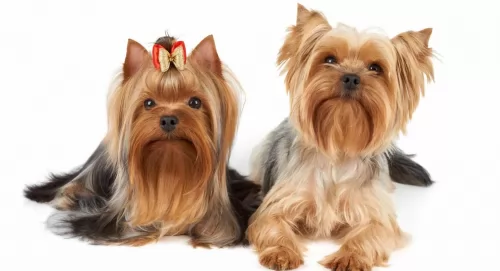 Petzlover
PetzloverBoth Yorkshire Terrier and Old English Terrier are originated from United Kingdom. Yorkshire Terrier may grow 22 cm / 8 inches shorter than Old English Terrier. Yorkshire Terrier may weigh 12 kg / 26 pounds lesser than Old English Terrier. Both Yorkshire Terrier and Old English Terrier has almost same life span. Yorkshire Terrier may have less litter size than Old English Terrier. Yorkshire Terrier requires High Maintenance. But Old English Terrier requires Moderate Maintenance
 The Yorkshire terrier originated in Yorkshire which is a place in northern England. In mid 19th century workers from Scotland came to Yorkshire in search for work. They brought different varieties of small terriers with them. Earlier they are known as Broken Haired Scotch Terrier and then Toy Terrier. In 1874 they were officially named as Yorkshire Terrier. They begun their journey as hunting dogs and later developed as companion dogs. AKC registered the breed in 1878.
The Yorkshire terrier originated in Yorkshire which is a place in northern England. In mid 19th century workers from Scotland came to Yorkshire in search for work. They brought different varieties of small terriers with them. Earlier they are known as Broken Haired Scotch Terrier and then Toy Terrier. In 1874 they were officially named as Yorkshire Terrier. They begun their journey as hunting dogs and later developed as companion dogs. AKC registered the breed in 1878.
Known also as the Black Terrier, by the 18th century, the Old English Terrier was available as a rough-coated dog as well as a smooth-coated dog.
The dogs were established in England. The dog was developed to work and by the 19th century the Old English Terrier was to be found all over the world.
The dog was developed based on the work it was required to do, leading to variations in the coat texture, the body and size. The Old English Terrier is recognized today by the National Terriers Club LLC.
 Yorkshire terriers are one of the glamorous member of the dog breeds. They have excellent personality as their owner will be surely proud of them when taking them in public. They like to go outside and make adventures. They are good companion dogs and watch dogs too. They are very affectionate with their owners. Yorkies always bark when any stranger comes and they should be taught about neighbours and when to bark. They will get angry on seeing new dogs and surely chases squirrels.
Yorkshire terriers are one of the glamorous member of the dog breeds. They have excellent personality as their owner will be surely proud of them when taking them in public. They like to go outside and make adventures. They are good companion dogs and watch dogs too. They are very affectionate with their owners. Yorkies always bark when any stranger comes and they should be taught about neighbours and when to bark. They will get angry on seeing new dogs and surely chases squirrels.
They like to spend more time with their people. Leaving them alone for long time is not good. Yorkshire terrier should be treated gently and with love. They love to spend time with older children. They love apartment life if they are made to play and walk daily. Yorkies are the second most popular dog in America.
The Old English Terrier is a working dog, a sporting terrier known for his athleticism. This is a vibrant dog, both physically and mentally, and the dog will require plenty of physical exercise as well as mental stimulation.
If you go to a reputable pet shop, you will find many stimulating toys for such a clever dog. He is also social and friendly and makes a wonderful pet.
Your Old English Terrier stands at between 30 – 45cm and weighs between 6 and 15kg. The face of the dog is wedge-shaped and the eyes are set wide apart. The ears are erect and the tail has been docked but is left long these days.
The coat of the dog can be either rough or smooth and it is available in solid black or white or a black and tan mix.
The Old English Terrier is a working and sporting terrier. He makes a wonderful companion pet. He is an intelligent, boisterous type of dog and early training and socialization are necessary to make him obedient and more amicable around people and pets.
They are loving with their human family, but because they require such vigorous exercise, they are better suited to life in the countryside as opposed to living in a cramped space in the city.
 Yorkshire terrier are not so much friendly with children. It is not advised to leave them with children without adult supervision.
Yorkshire terrier are not so much friendly with children. It is not advised to leave them with children without adult supervision.
They were previously used to catch rats and hunt badger and fox. They are excellent watchdogs and defend their territory very well.
They adapts well for apartment living. But they will not be happy if leaved alone for a long time. Yorkies cannot tolerate too hot or cold weather.
They are moderately easy to train. Yorkshire terrier should be trained early when they are amenable to process. Sessions should be conducted with lots of treats and must be short as they will easily get bored.
Your Old English Terrier is a working dog and while he is known to be independent and sometimes quite stubborn, he is intelligent and trainable.
He should be trained and socialized and then he becomes a great family pet, being amicable with children and other pets. He is a good natured pet but he has lots of energy and will rely on you to provide him with walks and games, whether you live in the city or the countryside.
Give him the right upbringing and you can be assured of the most splendid pet and companion.
There are some health problems with a dog that can be inherited, but some illnesses develop because of bad lifestyle and bad diet along with lack of exercise.
Your Old English Terrier can live to anything from 10 to 14 years of age, but there are always some common dog diseases that you may want to be aware of.
Dental disease, skin allergies, hip dysplasia, cancer, epilepsy, bloat and eye diseases are just some of the diseases that are highly unlikely, but which can be worrisome for your pet.
 For English bull dog puppies, When you change the puppy food from liquid to solid initially you must give what the dam is having. This is to avoid digestive problems when new food is introduced. The level of liquid food should be reduced in a step by step manner and thus increasing solid food gradually.
For English bull dog puppies, When you change the puppy food from liquid to solid initially you must give what the dam is having. This is to avoid digestive problems when new food is introduced. The level of liquid food should be reduced in a step by step manner and thus increasing solid food gradually.
You have two choices and one is manufactured dog food and another is home cooked food. Commercial brands are not suggested as they contain artificial coloring and chemical preservatives.
Vaccinations should be made at the right time. The food given should be the best.
Yorkshire terrier should be taught tricks by giving rewards. Exercising them has benefits such as maintaining muscles, release pent-up energy, good for heart, good metabolism, good sleep and be active.
Looking after your Old English Terrier is easy, whether you choose the short- or long haired breed, requiring you to brush him twice a week to remove those loose hairs. Check in and outside the ears for ticks and fleas and check around the eyes for infections.
Always run your hands over your dog to make sure there are no unusual lumps which could be indicative of cancer.
Make sure your pet has a nice dry, warm place to sleep, and if he is outdoors, make sure he has a spot to lie down in that is out of the sun and rain.
He is an active dog and will require a walk each day as well as ball- and rope games.
Every dog will benefit from a high quality diet, both commercially manufactured food and home-made food. Dogs want their meals to be simple, tasty, consistent and delicious.
Dry kibble needs to be of a high quality and you can add in simple home-made food to his kibble and which is simple – boiled chicken, brown rice or pasta and vegetables such as spinach, sweet potatoes and carrots. When you can afford it, some raw meat added into the kibble will be a welcome treat.
Such a simple diet will ensure you don’t battle with your dog’s digestion and it will keep him bright-eyed and healthy. Ensure a constant supply of fresh, cool water.